Studies show: people who have “too many interests” are more likely to succeed
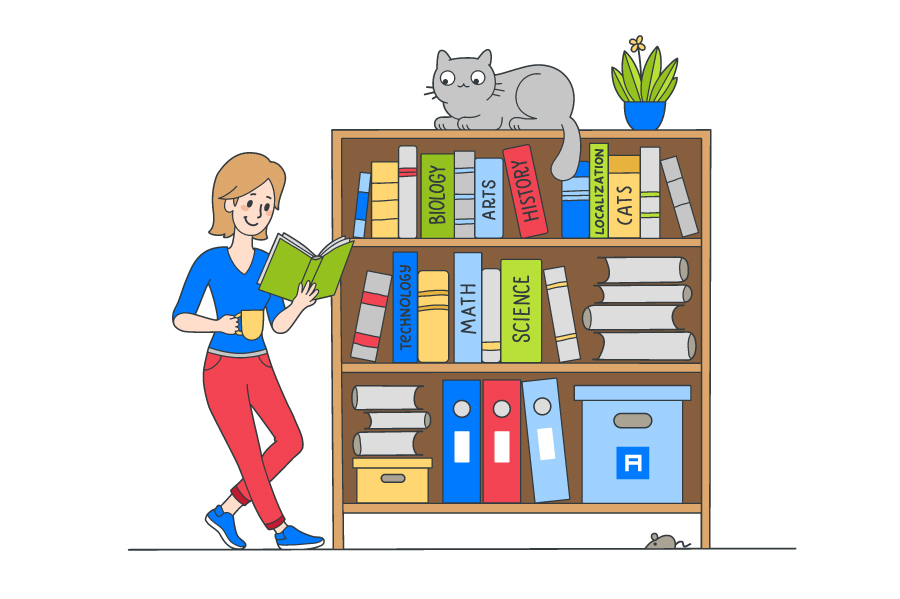
The most comprehensive case study explaining why in the modern “knowledge economy” almost everyone should become an encyclopaedist.
"Handyman, but really can not do anything."
')
The warning against universalism has been preserved in the centuries-old history of dozens of languages . “He doesn’t have any knives, and not a single sharp one,” warn the Chinese. And in Estonia there is a saying “nine crafts, and hunger is the tenth”.
However, many of the most extraordinary personalities - both those who lived in the past and our contemporaries - were generalists: these are Ilon Musk, Steve Jobs, Richard Feynman, Benjamin Franklin, Thomas Edison, Leonardo da Vinci and Maria Curie - the list is far from complete.
What is the matter here?
If the attempt of universalism is the path to mediocrity, then why did the most comprehensive study of the most prominent scientists in history show that 15 out of 20 were encyclopaedists? Newton. Galileo. Aristotle. Kepler Descartes. Huygens. Laplace Faraday Pasteur. Ptolemy. Hooke. Leibniz. Euler. Darwin. Maxwell - all encyclopedists.
If you try to do everything at once so inefficient, then why are the founders of the five largest companies in the world - Bill Gates, Steve Jobs, Warren Buffett, Larry Page and Jeff Bezos - all encyclopedists ( and also adhere to the "five o'clock rule" )? Are these legendary people just brilliant exceptions? Or are these people whom we could (and should) emulate in order to achieve success in the modern “knowledge economy”?
If the pursuit of universalism is an ineffective career strategy, then why have more than 10 academic studies revealed a correlation between the number of interests / competencies that a person has been able to develop and his creative potential?
Transferred to Alconost
The era of modern encyclopedists

"The future is for integrators".I will define a modern encyclopedist as a person who has mastered at least three different subject areas to perfection, and was able to integrate them into an elite set of skills that 1% of people possess.
- teacher Ernest Boyer
In other words, they combine all the best achievements of humanity from different disciplines, which helps them to more effectively cope with the chosen specialization. Below is a T-shaped scheme in which they fit. Experts, in turn, focus only on knowledge from their own subject area.
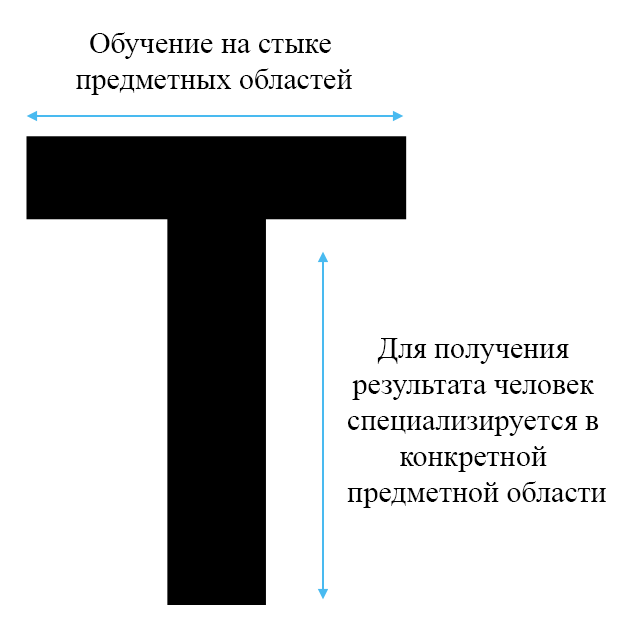
Since this concept was popularized in Malcolm Gladwell’s book “Geniuses and Outsiders”, many now believe that in order to become a world-class specialist, you need to consciously practice working for 10,000 hours to win the competition, as deeply as possible. in the subject area. Modern encyclopedists directly contradict this popular advice, developing atypical interdisciplinary combinations of skills and knowledge, and then integrating them and giving breakthrough ideas, moreover, they even invent completely new disciplines and industries where there is almost no competition .
For example, we have been studying biology and sociology for hundreds of years. But no one studied them together and did not know how to combine them until the researcher E. O. Wilson in the 1970s became the first to deal with sociobiology. You can also recall the modern heroes of techies, for example, Steve Jobs ( of which I am writing here ), who became famous for how they managed to combine the design with hardware and software.
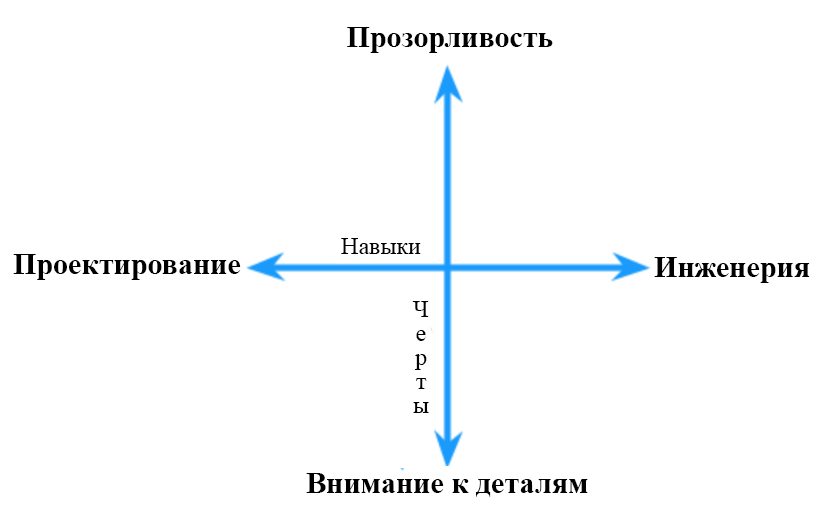
Ilon Musk ( about which I am writing here ) managed to combine ideas about physics, engineering, programming, design, production and business, thus creating several companies operating with many billions of dollars and working in completely different industries. He not only developed nontrivial combinations of skills, but also has an atypical combination of personality traits.
Charles Darwin, the creator of one of the most important theories in history - the theory of evolution - was also an encyclopedist. Stephen Johnson, author of the book Where do good ideas come from (one of my favorite five books of all time), brilliantly describes Darwin's first scientific breakthrough:
“This idea originated on the basis of various disciplines: to solve a mystery, Darwin had to think immediately as a naturalist, a specialist in marine biology and a geologist. He needed to understand the life cycle of the coral colonies, to observe tiny relief organic sculptures on the rocks of the Cocos Islands; to reflect on the colossal time periods during which volcanoes have time to grow, and then to fall into the sea ... To understand this idea in all its complexity, it required a kind of probing mind, ready to embrace such different disciplines and scales. ”
A more vital example is connected with my bosom friend Elizabeth Sanders. Elizabeth is fond of literary creativity, Christianity and time management - and, by combining these interests, she created a thriving coaching business based on Christian principles; she promotes her method in books and articles . A whole home business is associated with time management, however, there are almost no resources on this topic in a religious vein.
To become a successful online author, I deliberately combined academic studies, digital journalism and explosive growth techniques, gathering all this into a single bundle of skills. I did not attend any of this in college, but I constantly practiced and sought coaching on these topics. I noticed that scientists usually treat journalists condescendingly, journalists look down on marketers, and marketers on journalists and scientists. However, it is unclear to many that each of these specialists can bring something valuable to the common cause, and that the combination of such skills helps to develop great ideas designed for a wide audience.
Why to be an encyclopaedist is a new norm of our time
“Study the science of art; study the art of science; learn to see the world holistically; understand that everything is interconnected. "
- Leonardo da Vinci
Encyclopedists have always existed - in fact, it was they, more than anyone else, who contributed to the development of Western civilization. However, they were called differently in different historical periods. The following chronology demonstrates the evolution of this concept over time.
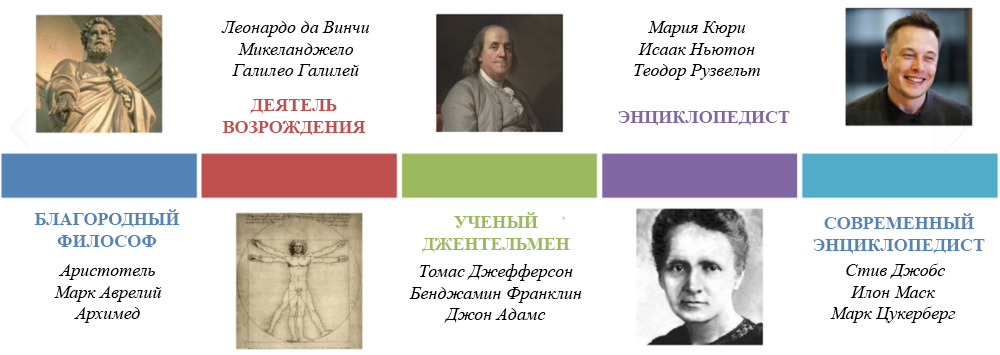
But should most people really go this way?
Right now, in our knowledge economy, we see several trends of change, turning established ideas about the value of specialization upside down. In the modern world, diverse interests are not a vice, but a blessing. Now being an encyclopaedist, not a specialist, is a virtue, not a disadvantage.
People who like interdisciplinary training usually achieve greater financial success, and, building a career, achieve greater influence.
Next, I propose the most complete rationale known to me, explaining why it is worth becoming an encyclopedist.
The first advantage of the encyclopedist: combining two or more skills, you can become a first-class specialist.
Scott Adams, the author of a character named Dilbert (one of the most popular comic book characters of all time) was not the biggest fun. He was also neither an outstanding draftsman, nor a highly experienced worker (when he began to paint Dilbert, he was not even thirty). However, thanks to his sense of humor and illustrator skills, he surpassed all those who worked in this niche. The author wrote an in-depth article explaining how he did it and how you can achieve the same.
If you want to achieve [in life] some outstanding success, then there are two options:
- Learn to do something better than anyone.
- Very well mastered (you need to enter the first 25%) two or more specializations.
The first strategy is very difficult, if not to say - practically impossible. Few people are destined to play in the NBA or release a platinum album. I do not recommend anyone to even try.
The second strategy is quite simple. Each opens at least a few areas where it is within its power to get into the top 25%, if you stretch a little. In the end, I paint better than most people, but I’m hardly an artist. I do not indulge in humor with ordinary stand-up comedian, who does not have enough stars from the sky, but I am joking better than most people. The magic is that only a few can draw well and make jokes. It is thanks to the combination of these two skills that I am so special. And if you add my experience in business - this is a topic that a cartoonist who does not live by it can hardly understand.
The second advantage of the encyclopaedist: as a rule, a nontrivial combination of skills leads to a creative breakthrough.
The power of non-trivial combinations of skills becomes obvious if we recall the most influential scientific works in history. Researcher Brian Uzzi, Professor of the School of Management. Kellogg at Northwestern University, analyzed more than 26 million scientific articles over hundreds of years and found that the most influential works are often created by teams with an atypical professional background . In another detailed study, Uzzi compared how often different academic articles are cited and how many other articles they cite. A remarkable pattern was found. In the most popular studies, such articles were cited in which atypical sets of works from different disciplines (90% of expected quotes from their own discipline and 10% from other disciplines).
The third advantage of the encyclopaedist: he, like anyone, is simply perfect in mastering a new skill.
Want to learn a new and valuable skill and add it to your arsenal? Now it is quite simple for you:
- The quality of knowledge in each subject area increases. Researchers and practitioners systematically improve and test the strength of each discipline of their knowledge in order to strengthen it. As a result, old deceptive ideas are discarded, and new ideas are assimilated. Now technological disciplines are more intelligent than, for example, 20 years ago - the same goes for physics and biology.
- Secondly, in the access appeared a mass of free or low-cost information from the world's largest experts in any conceivable discipline. Want to join the community or get expert advice? There are hundreds of thousands of online courses and billions of videos online. Now is the golden age for those who like to learn, are willing to invest in themselves and are disciplined enough to act independently.
My favorite example of first-class and easily accessible knowledge is the story of a twelve-year-old girl Edilin Malcolm , who in a matter of months learned to dance dubstep, constantly watching short clips uploaded online and practicing until she perfectly mastered every pas and began to flawlessly perform the entire dance .
Imagine how Edilin would learn to dance before the advent of Youtube. She probably would not have found a dance school near the house where they learn dubstep. Even if she had found, she would hardly have caught a first-class teacher. Further, Edilin could not study this dance for hours as instituted. Even if there were some videos of dubstep recording, she would have to convince parents to make $ 20 each. YouTube gave Edilin a chance to learn for free from world-class teachers and dancers on convenient graphics. Today, the search query “learn dubstep” (learn dubstep) on Youtube gives more than a million results !
Want an even more compelling example? Please - thirteen-year-old Michael Syman. He independently learned to program, using Google. One of the mobile games written by him entered the top 100 most popular applications in the world, ahead of Starbucks and Yelp. You can look at the eleven-year-old Amir Willhhagen , who perfectly learned to sing operatic parts after four years of self-study on YouTube videos. Something large-scale is going on here, and these geeks are only the first signs.
"I saw farther than others only because I stood on the shoulders of giants."
- said Newton
Today, such shoulders are more than ever.
The fourth advantage of the encyclopaedist: now, as never before, it is easy to become a pioneer in a new discipline, industry, or master a new set of skills.
Although, due to the explosive accumulation of knowledge to a single person, it becomes impossible (or, at least, much more difficult) to know everything, while it also becomes easier to find a large and non-trivial combination of disciplines or skills. Becoming an encyclopaedist is now easier than ever.
That's why.
First, one of the main mechanisms for the emergence of new skills, industries and disciplines - a combination of existing ones.
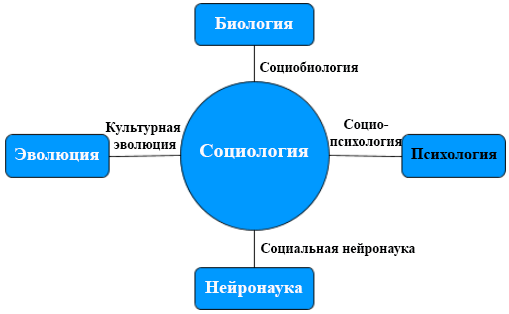
Secondly, the number of new academic disciplines and commercial industries is increasing exponentially.
Finally, as the number of new skills increases, the number of potential new combinations grows exponentially. Theoretically, any new area of knowledge can be combined with any other. In each new breakthrough lies the potential for countless new breakthroughs.

If you have only one component (A) at your disposal, then the combination from it will be the only one - “A”. If two (A and B), then three of them can be made (A, B, A + B). With four components, we get up to 15 possible combinations, and from that moment on, the number of options begins to grow radically. Now we consider that there are thousands and thousands of disciplines, industries and skills. Each new version potentially adds tens of thousands of new combinations.
The following are some of the thousands of recent disciplines that have emerged from such combinations:

Conclusion: I remember how being a high school student I read about the disappointment of the young Leonardo da Vinci: he believed that he was born in an era when everything that was worth discovering was already open. I remember this quote, because its author was one of the greatest inventors in the history of mankind. It is useful to recall this quote, because today it has not lost any relevance at all. Almost ALL the potential discoveries that await humanity - the fate of the future.
The fifth advantage of the encyclopaedist: so you insure your career.
“It’s not the strongest or the smartest who survive, but those who are better able to adapt to change than others.”
- Charles Darwin
What do the following six professions have in common?
1. Application Developer
2. Social Network Manager
3. Designer unmanned vehicles
4. Cloud computing specialist
5. Big Data Explorer
6. YouTube content author
Answer: None of them existed 15 years ago. Imagine what opportunities would open up to you if you could go back in time, learn these skills, and then become one of the best specialists in this profession, when it will be at its zenith? There is nothing to guess - you would have every chance to become a millionaire. The following heading demonstrates how valued an unmanned vehicle engineer is today.
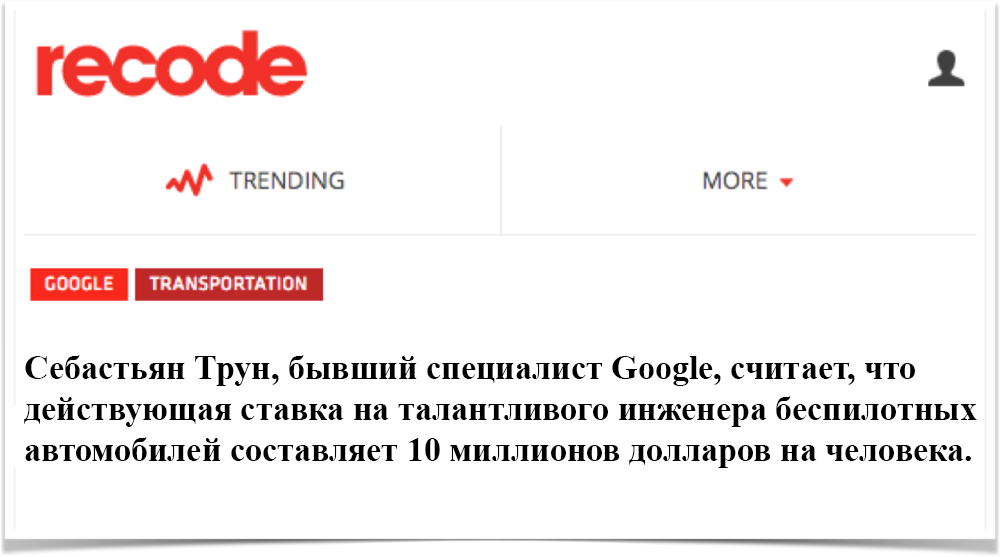
So, what skills will be valuable in 20 years? You know?
Not? And I do not know. Nobody knows.
So, the question arises: how is it now to invest in knowledge that will pay off only in the distant future?
I can say that in this case the encyclopedist finds himself in a much more advantageous position than a specialist. An encyclopaedist can take on already learned skills and quickly recombine them in a new way to sort out new disciplines. On the other hand, a specialist whose discipline becomes obsolete is likely to spend much more time to adjust to the changes and start all over again.
In the face of accelerating change, we will have to become encyclopedists in order to survive. We need to work with a dozen careers. For each of them will require new skills.
The sixth advantage of the encyclopedist: you will learn how to solve more complex problems.
Many of the biggest problems confronting society and individuals are solved with interdisciplinary capabilities.
Take, for example, obesity. As shown in the following diagram, in the US, four of the fifteen leading causes of death are associated with obesity and diet. Millions of deaths can definitely be prevented.

From the side it is easy to say that it is easy to eliminate the crisis from obesity. Just eat less and exercise. So? Not quite.
Below is a diagram from Scott Page's Bonus of Diversity book, where it is only partially shown how complex the obesity epidemic is. As you can see, to solve this problem, it is required to take into account various disciplines: psychology of physical education, genetics, behavioral psychology, sociology, economics, marketing, general psychology, pedagogical system, dietology.
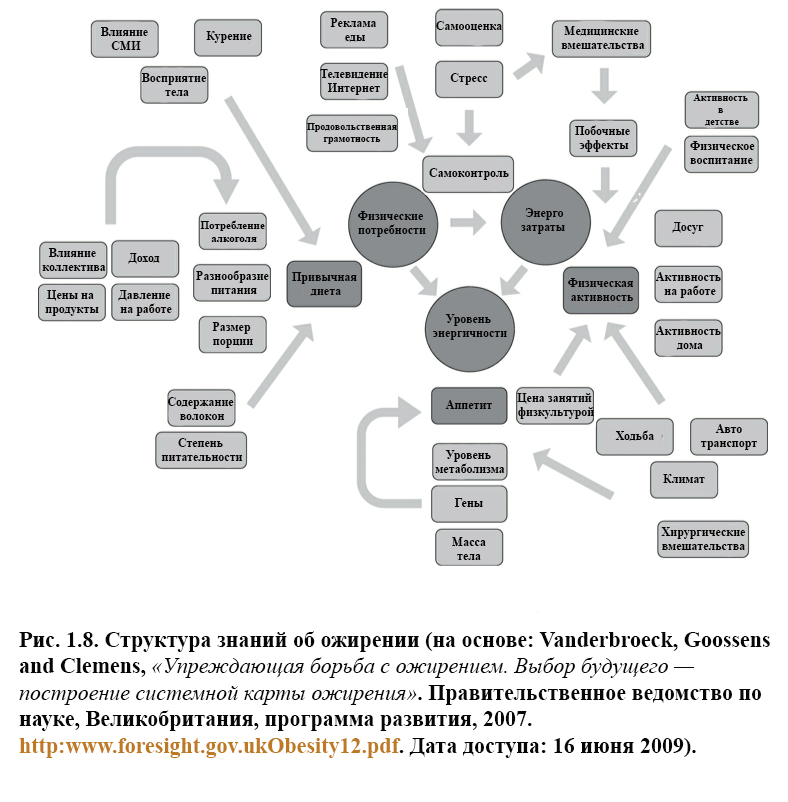
Seventh advantage of the encyclopedist: it is easier for you to stand out and compete in the global economy.
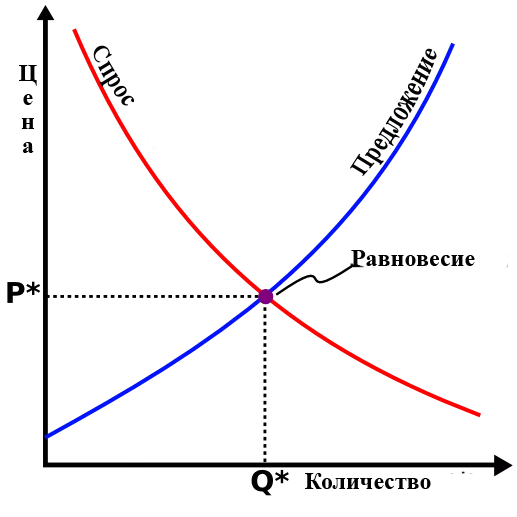
One of the most basic cognitive models in economics describes supply and demand ( for more details on valuable cognitive models ). It is important for the labor market, the markets for goods and services, for the world of ideas and in many other contexts.
In this model there are two ways to increase the price premium, which will be at your disposal:
- Reduce the sentence (shift the blue curve to the left).
- Increase demand (shift the red curve to the right).
You have the most valuable set of skills in the world, however, if all the others have this set of skills, then you are consumer goods. Becoming an encyclopaedist and having developed a unique set of skills that almost no one else possesses, you can stand out and earn more.
Do you want a rapid test - check if you have rare and valuable knowledge? Then ask yourself the same question that ask candidates (considered for employment) and applicants (for investment) billionaire Peter Thiel, one of the largest investors in Silicon Valley. “What is your conviction, which you sincerely believe in, but which no one around shares?” This simple question very quickly shows whether you have rare and valuable ideas. If you have nothing to answer it, then perhaps you are not so original thinking as you used to think.
This cognitive model is widely recognized among the world's largest investors and the most successful people. Take, for example, the following quotes:
“Be greedy when others fear. That's how simple it is. ” - Warren Buffett, founder of Berkshire Hathaway
"To get to the top of the table, you need to stand out from the crowd." - Howard Marks, founder of Oaktree Capital (more than $ 2 billion)
"You will not earn money until you agree with the majority opinion." - Ray Dalio, founder of Bridgewater Associates (the largest hedge fund in the world)
“The best projects are most often overlooked, and not glorified by the crowd; the best tasks that deserve development are those that no one is trying to solve. ” - Peter Thiel, founder of PayPal and a billionaire investor (worth 3.3 billion dollars)
"To be the first, you need to break away from the team." —Dr. Seuss
“The weakness of art is in dogmatics. When I compete with a person of a different specialty, I try to find the dogma of this specialty. When I compete with a disciplined person, I try to find his personal dogma. ” - Josh Weizkin, chess grandmaster and Taijiquan world champion
Conclusion: develop anti-fragility
Being an encyclopaedist is a new norm, and encyclopaedists, having to combine various knowledge to create breakthrough innovations and solve complex problems, will move mountains. Universals who do not know how to add up their knowledge in such a way as to create something valuable for those around them will continue to live - perhaps they will have an impressive breadth of knowledge, but they will not achieve anything.
Meanwhile, experts risk falling into the trap of their own success. They develop a highly specialized set of skills and reputation, they start to earn a lot. However, such a career is fragile. If someone else's profession changes or disappears, it will be practically impossible for a specialist to switch to something else - just start all over again.
So, we have seen how important it is to be an encyclopedist today, so it’s logical to ask the following question: how to do it?
How to become a modern encyclopedist
"All the greatest scientists are artists in their own way."
- Einstein
The idea of becoming a modern encyclopaedist may seem discouraging. Where to begin? What discipline to master first? How to find the time? How to convert the studied into a truly valuable result?
When I first started interdisciplinary training, I immediately got stuck. I remember how I took a book on biology, which I hadn’t studied since high school, and tried to find practical application of this knowledge. In other words, I started from the wrong discipline (it did not suit me), and I studied incorrectly. Through trial and error, I developed a series of techniques that help me switch from discipline to discipline faster and faster.
I studied how to be an encyclopedist for hundreds of hours, I asked encyclopaedists - and one of the key phenomena that I managed to figure out was related to cognitive models.
First, cognitive models cover a multitude of disciplines. They are like invisible links connecting disciplines together.

For example, when you learn the “80/20 rule”, according to which, in many areas, 20% of the effort expended gives 80% of the result, you can use this model to improve efficiency in any area of life, as well as in any discipline studied. There are 20% of acquaintances that provide you with 80% of socialization. 20% of clients making you 80% of a business. 20% of the tasks, providing you with 80% productivity. And so on!
Moreover, cognitive models help you learn a lot of skills faster, because they give you a stable base of necessary universal knowledge that you can use for the rest of your life. Consequently, moving on to a new discipline (perhaps even without having real experience in it), you will quickly notice which cognitive models are applicable here.
In short, cognitive models are the key to improving the encyclopedist.
About the translator
The article is translated in Alconost.
Alconost is engaged in the localization of games , applications and sites in 68 languages. Language translators, linguistic testing, cloud platform with API, continuous localization, 24/7 project managers, any formats of string resources.
We also make advertising and training videos - for websites selling, image, advertising, training, teasers, expliners, trailers for Google Play and the App Store.
Read more
Source: https://habr.com/ru/post/354822/
All Articles